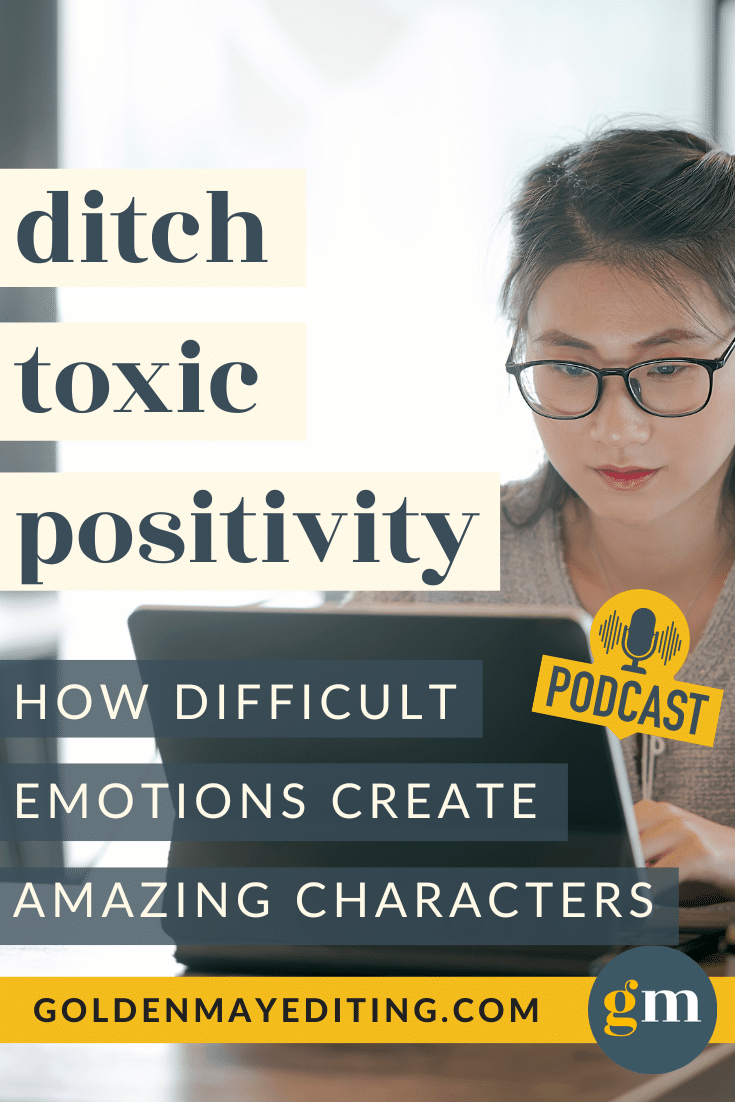Toxic positivity is crippling your writing life.
There’s a belief becoming more pervasive in the writing community that you must always stay positive and never let anything negative affect you or your mentality.
If you do this, you’ll achieve everything you want, attract all the readers and writers you can, and you’ll stay happy the entire time.
The push for continual and constant positivity, while pushing away anything that might be or feel negative, is what I’m labeling as “toxic positivity.”
You’ve likely seen this in the writing community and elsewhere. It’s the “positive vibes only ✌🏻” attitude, the one where social media influencers pretend to push away anything they deem “negative” in order to remain happy all the time. You’ve probably heard it among your friends, where someone shuts down any kind of outside voices that “harsh the vibe.”
The idea of positive vibes only seems appealing. Why wouldn’t you want to stay positive all the time? Why wouldn’t you want to avoid anything that can bring you down?
I call major bullshit.
Toxic positivity is one of the biggest falsehoods draining you of your creativity and divorcing your humanity from your writing.
Somehow, this belief has begun to become synonymous with a “healthy writing mindset,” as if your ability to ignore all negativity in your life somehow means that you’ve reached peak mental health and are operating at the highest state of your being.
But it’s completely wrong. Maintaining a constant positive attitude is not only impossible, it is also greatly harming you.
How do you feel when you try to “stay positive” only to have a bad day? How does it feel when something outside of your control makes you frustrated or upset or angry?
You begin to police your own emotions, telling yourself that you shouldn’t be [insert emotion] and instead you should just be positive.
This is the heart of the shame narrative that tells us having emotions is somehow less than or morally wrong.
The truth is that embracing your negative emotions and understanding they are part of the ebbs and flows of the writing process allows you to create a healthy mindset that serves you and your writing.
On today’s episode of the Story Magic ✨ podcast, we’re diving into toxic positivity.
In the episode, we’re diving into why trying to stay positive all the time is not only impossible, it’s also an emotional trap that damages your mental health and makes writing harder.
“Negative” emotions are demonized when really they’re simply a part of the human experience. We all feel them. We all deal with anger, frustration, sadness, rage, annoyance, etc. every single day.
So why have we tried to attach a morality to those feelings? Why have we somehow decided they are “negative” vs simply important information that tells us how we’re experiencing a certain event?
Shame and control.
We feel out of control when we experience the “negative” parts of human emotion. Then, we shame ourselves for feeling these uncomfortable things, and then we label them as bad. That label alone begins to make us feel guilty for having emotions that are uncomfortable.
Instead of attaching some sort of value to the things you feel, let’s just call them “difficult” or “uncomfortable.”
Let’s stop invalidating the difficult parts of our lives, and then shaming ourselves for feeling that difficulty.
Let’s stop demonizing ourselves and our feelings—which, in my opinion, is a hallmark of misogyny.
Difficult emotions are what give us the humanity that brings depth and value to our stories.
The hard parts of our lives help us understand the struggles of those around us, and merge those struggles into our characters.
When we ignore those tough parts, or cut them out of our lives entirely, we stop knowing our characters. We start creating characters that feel bland, lack depth, and don’t struggle with or against anything. Those characters are boring because they don’t feel anything real.
When we have felt the depths of human emotions, we can create characters that truly resonate with our readers.
But we can’t do that if we’re invalidating our own emotions.
Once we embrace the full spectrum of our emotions, we can create characters that do the same.
It is within these difficult spaces that we understand the struggles of those around us. That creates empathy, which every single writer needs in order to connect with their readers.
The next time you think “How can I be more positive in my writing life?” I encourage you to stop shaming your negative thoughts.
A healthy mindset is not about shutting out negativity. It’s about living with them, experiencing them at their fullness, introspecting them, and loving yourself through them.
Listen to “Toxic positivity in your writing life” now!
PS—Enjoying the Story Magic✨ podcast so far? It would mean so much to us if you would share the podcast with a writer friend you think it would help! Then, leave us a rating or review to help other writers find us and listen in.
Happy writing!
xo,








Leave A Comment